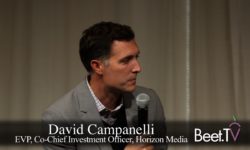For so many years, the fear has been that the major online platform companies were sucking money from traditional media.
But television may now be pulling back some of that ad spend, because the old dog is learning new tricks.
“Several years ago there was a big move towards the digital side of things and spending. I think that balanced back,” says David Campanelli.
He should know. As EVP and co-chief investment officer for the advertising agency Horizon Media, Campanelli is responsible for the ad spending decisions of account clients likeWeight Watchers Burger King, Corona, LG, Little Caesars and Capital One.
“Now it’s a little bit more about, ‘How can we use TV more intelligently to target our audiences?’,” he says. “I think that the budgets have found their levels across different media types. Really now it’s about trying to find smarter ways to use linear TV, smarter ways to use OTT, which is a relatively new platform, to deliver that audience.”
If Campanelli’s own spending patterns are playing out industry-wide, they are not yet visible in available data.
eMarketer projects 2020 US TV linear and broadcast ad spend will grow 1% – but thanks to it being both an election year and an Olympics year. Thereafter, the forecast is for a 1% decline in each of the three years to 2023 – the main rationale being the rate at which viewers are cutting the cord for subscription, ad-free video services.
Still, that migration could exist alongside the trend in which linear TV is gaining new super-powers – namely, the ability to
- target ads at individual households
- control the frequency with which they are seen
- plan campaigns seamlessly across platforms, including TV
- discover audience outcomes that occurred as a result of a TV ad
Horizon is pushing more clients’ ad spending in to this data-infused reincarnation of television because it offers such features.
The agency began its journey with the medium by leveraging third-party data sales houses to uncover the right audiences for its brands.
Then it graduated to building its own data platform, used to plan all its buying in the marketplace using digital identities
Even so, Campanelli can see the risk in excessive precision-targeting.
“With better targeting becomes more narrow audiences and more narrow reach of your buys,” he says. I think there’s a risk of going too narrow, too addressable, and not having that broad reach.”
Beet Retreat In The City @ Horizon Media is presented by 605 and Spectrum Reach. For more videos from the event, please visit this page.












































